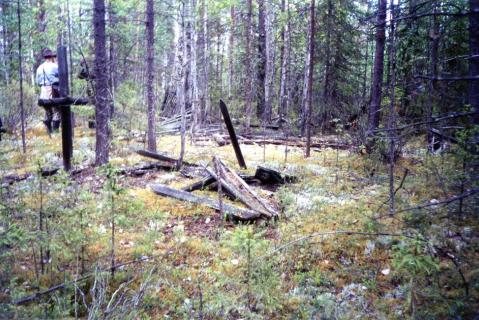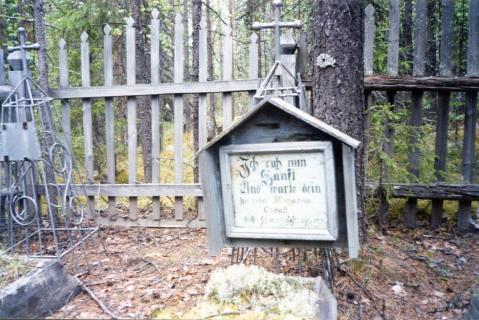In the early 1940s prisoners were based at Dozmer station as they built a section of the North Pechora railroad. Next to their outpost was a section of the Kozhvin Forestry Concern and in 1943 a special settlement was organised there. Among the forced settlers were Soviet Germans deported from the Volga, Lithuanians, Estonians, Ukrainians and Russians. They all worked in the forest. Those who died were buried in the same graveyard. The special settlement regime was lifted in the mid-1950s.
In July 2001 the graveyard was studied by an exploratory group of pupils from Syktyvkar led by I.V. Sakhin and from Kadzherom settlement led by T.G. Afanasyeva. They drew up a map of the area and photographed the surviving grave-markers. There are reports that Lithuanians came to Dozmer in the early 1990s and took away the remains of their relatives to be reburied at home.
The electronic Book of Remembrance (Gedenkbuch) of Russian Germans contains biographical entries on more than 100,000 Soviet Germans variously sentenced under Article 58, deported as forced settlers, or mobilised in camps of forced labourers.
Research on the Genocide of the Lithuanian People (Lietuvos gyventoju Genocidas; 3 vols. 1999-2009) contains about 130,000 biographical entries (in Lithuanian) and see Deportation of Lithuanians, 1941-1951 for the 29 other burial grounds and commemorative sites on the Map of Memory.
The Memorial online database (2025) lists 129,473 victims in the Komi Republic. (See Nizhny Chov.)
Among them were over 64,000 deportees sent to or born in the Republic. During collectivisation (1929-35) they numbered 20,366, a quarter of whom were aged 1-10. In 1940 there was a massive influx from occupied Polish territory (19,367). More, mainly Germans (5,970) were sent in the 1940s and 1950s (6,699).
The database names 63 who were sent to the Dozmer special settlement, 36 of them Soviet Germans.
*
Six volumes, published between 1996 and 2005, document political arrests in Estonia from 1940 to 1988 and deportation in 1941, 1949 and early 1950s; names of 75,827 who were deported and 49,664 who were convicted of “crimes against the USSR”.
Since 1992 a State programme has supported and funded the publication of over 110 volumes of books of remembrance, covering all of Ukraine’s regions (including Crimea) entitled Rehabilitated by History (2002-2017), listing about 600,000 names.
| State of burials | Area | Boundaries |
|---|---|---|
|
Subsidence over burials; some graves and grave-markers have survived
|
not determined
|
partially delineated
|
[ Original texts & hyperlinks ]
“Materials of exploratory expeditions of the Pechora museum of history and local studies, 2001”, Archive of the Pokayanie Museum (Pechora)
“The history of German families in biographies: the fate of Germans in the Pechora district”, A book of remembrance of Komi’s Russian Germans (online resource)


